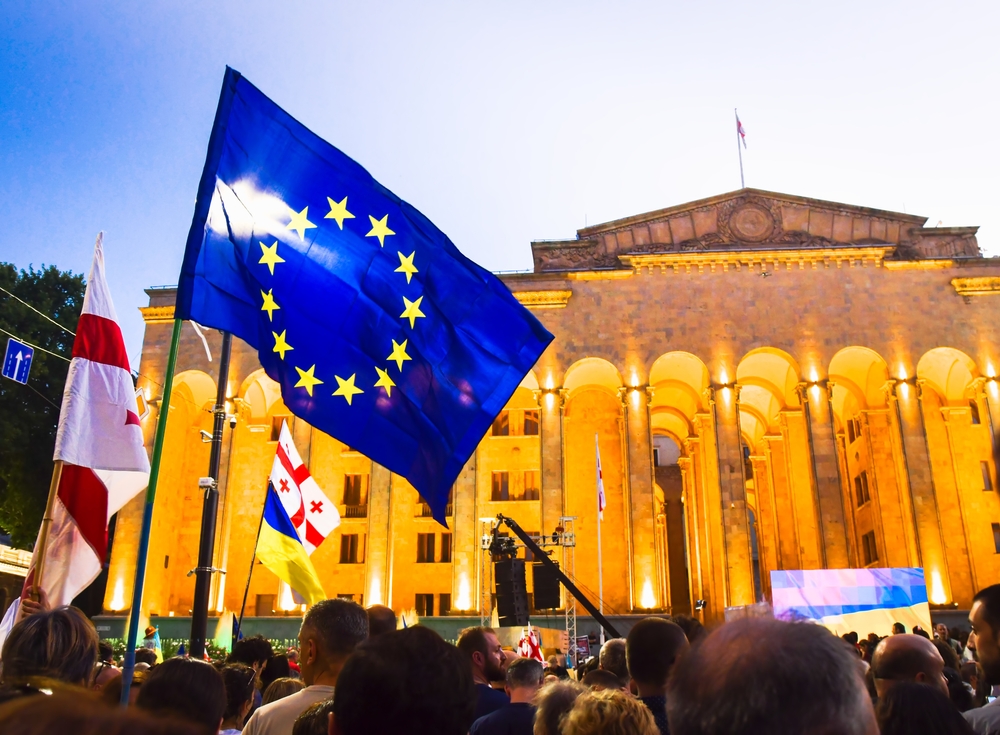
Tbilisi, Georgia - 20th June, 2022: People by georgian parliament on major EU-pro rally event © EvaL Miko/Shutterstock
Last week’s decision by the European Commission to recommend Georgia receive European Union candidate status caught many by surprise. While most Georgians celebrate, the road ahead remains long and difficult
Last week’s decision by the European Commission to recommend Georgia receive European Union candidate status caught many by surprise. A survey conducted by the Tbilisi-based Caucasus Research Resource Centre (CRRC) in the previous days showed that, despite widespread support for EU membership, only 33% of respondents believed it would obtain it. Unlike Ukraine and Moldova, which became candidates in June last year, Georgia had instead been required to address 12 priorities first.
Despite some progress towards those goals, only three satisfied Brussels to some extent and Georgia now needs to address nine areas of concern . In an increasingly charged and polarised environment, with Tbilisi cautious about irking Moscow, there also remain allegations that the government instead sought rejection. Georgian President Salome Zurabashvili even urged the public to gather outside the presidential palace on the evening of the decision – possibly to celebrate if the status was granted or to protest if it was not.
Zurabashvili, now estranged from the very authorities that facilitated her presidency, narrowly survived an attempt to impeach her last month over what were considered unauthorised trips to European capitals to lobby for candidate status. While the European Commission's decision now alleviates concerns about political instability, it does not guarantee smooth sailing ahead. Last week's recommendation is not the final decision; that will be determined by EU leaders next month.
“[…] we should not forget that the recommendation to grant Georgia the candidate status is linked to fulfilling important steps”, EU Ambassador to Tbilisi Pawel Herczynski said in press remarks , making specific references to the rule of law, media freedom, and holding democratic elections. “Addressing these steps will be crucial to move to the next stage. This is the nature of the enlargement process: constant reform […]”.
Georgia is also expected to counter anti-EU disinformation and propaganda and align its policy with Brussels' in terms of foreign affairs and security. Many consider this a direct reference to Moscow evading EU sanctions through its former satellites of Armenia and Georgia since last year’s invasion of Ukraine. Nonetheless, despite the EU acknowledging only 'limited progress' since June last year, the government hailed the decision as a success.
"It's a great honour for me to congratulate you all on this historic decision", Georgian Prime Minister Irakli Garibashvili said in a briefing though also attacking his opponents. "I want to state […] that, unfortunately, the opposition – and, of course, I mean the radical opposition – has done nothing on our country’s path to European integration”, he said to the pro-opposition Rustavi-2 television channel.
"The European Commission has released a positive recommendation on granting our country candidate status”, Georgian Foreign Minister Ilia Darchiashvili posted on X . “This is a clear recognition of the very intensive work done by Georgia on this important path. Together, we have showcased our strength, unity and commitment to European values”.
But Michael Roth, Chair of the Foreign Affairs Committee of the German Bundestag, disagreed. “The Georgian government has done too little to deserve the candidate status – it has distanced itself from the EU+ values”, he also posted . “The recommendation […] should therefore above all be understood as a gift to the overwhelmingly pro-EU civil society and Georgian population”.
Indeed, a number of NGOs are encouraged by the news.
“The common national goal – to become a member of the European Union – transcends all political and other differences”, a number of NGOs said in a joint public statement . “This goal unites the whole society, all citizens. […] Today, we must unite our voices for our future and address the leaders of the 27 EU countries. In December, the voice of the Georgian people will be decisive in the final decision to grant Georgia candidate status”.
And though that final decision is possibly a done deal, the coming weeks remain sensitive. A day after the recommendation, President Zurabishvili was listed as a speaker at last week's Paris Peace Forum on a panel with European Council President Charles Michel. However, a day before the event, her name was removed with Prime Minister Garibashvili's listed instead. Additionally, his government once again accused Zurabishvili of making another unauthorised trip.
But on the first day of the Forum, perhaps in a positive sign that compromise was reached, both were listed and participated in two separate panels at the event. Even so, while most Georgians celebrate, the road ahead remains long and difficult, though it could have significant ramifications for the region.
“I would like to welcome the decision of the EU Commission […]”, Armenian Prime Minister Nikol Pashinyan said at the Paris forum alongside his Georgian counterpart. “I will not congratulate Prime Minister Garibashvili now. I will officially [do so] when the European Council makes a decision. […] we are following developments very closely. We hope and wish Georgia every success on this path”.
blog comments powered by







